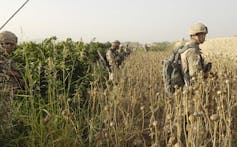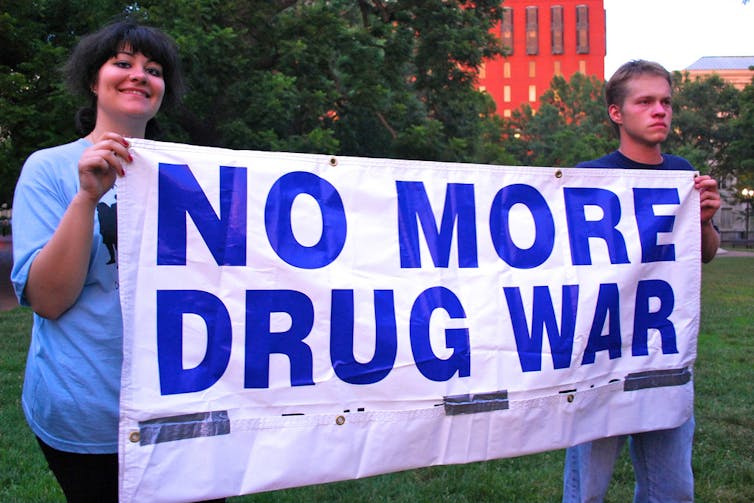Bennett War on Drugs Was Not a Failure Could Be Done Again
It'due south official – the so-called War on Drugs has failed. A report released by thinktank Australia21 in parliament today makes it articulate that not only has it failed miserably, simply that political elites effectually the globe have known this for a long time.
If, however, the aim of the State of war on Drugs was to create a dynamic and vigorous blackness market, and provide an ever-expanding variety of drugs of increasing purity at lower and lower prices while enriching organised crime, bikie gangs and corrupt police, and so drug prohibition has been an overwhelming success.
Whose problem is this?
Very interesting, simply not your trouble? Think about that over again. If you take sons and daughters, brothers or sisters or nephews and nieces, and then this is your problem. If you ain belongings, pay insurance on your property and have expensive alarms, so this is also your problem.

If you feel uncomfortable about Australian soldiers in Afghanistan being shot at with guns and bullets paid for from the lucrative proceeds of opium sales, and so this is your problem. If the idea that your compatriots dying of AIDS or cancer cannot get some relief from medical cannabis offends you, then this is also your trouble.
What drug prohibition has achieved is make a bad trouble much worse at great expense. Three-quarters of the funding of measures against illicit drugs is allocated to law enforcement. That is, to customs, police, courts and prisons. Well-nigh 17% is spent on efforts to reduce demand with 10% going to didactics campaigns and seven% to treatment. Only one% is spent on harm reduction, such equally needle syringe program.
The rest is spent treating medical complications and miscellaneous costs. This 75: 17: i partition is always referred to by our politicians as "a counterbalanced arroyo".
We don't have much of an idea about the return on investment for drug constabulary enforcement. But a 1994 RAND Corporation study on cocaine estimated that the return for US citizens on a US$1 investment was xv cents for eradicating coca plants in South America, 32 cents for interdicting supplies of refined cocaine between South and N America, 52 cents for United states Customs and constabulary merely $7.46 for treatment of U.s.a. citizens with severe cocaine issues.
The aforementioned study establish that 93% of The states authorities spending was allocated to the three loss-making interventions while 7% was allocated to the but assisting response – treatment.
Non sound business
A big part of the problem is that governments rain gilt bars on things that don't piece of work well while feeding small-scale modify to health and social interventions that are really good investments.
Remember the final fourth dimension you heard a talkback radio commentator tell you that methadone doesn't work? Well, it gives a return of $7 for every $1 invested. Needle syringe program send the wrong message? Every dollar spent saves $27 overall, including $iv in health-intendance costs.
Politicians from both sides of politics love to keep telling the community that more decisions have to be made like they are in the globe of business organisation. They desire u.s. to think of policy decisions in terms of a rest sheet.

The alternative is to classify scarce resources to policies and program that are known to non work but have strong sentimental involvement or the support of powerful vested interests, such as individual prisons and those employed in the criminal justice system for drug prohibition.
It'due south also easy for them to abet for the War on Drugs considering many parents who have minor children imagine are terrified that their kids volition be offered drugs.
Then where to from here?
If it'southward articulate that Program A, with it's focus on law enforcement, doesn't work, it's not all the same articulate what Plan B is going to be. Part of the difficulty is the poor quality of the contend – sometimes referred to as the "drug trouble" problem.
I was ane of 24 participants in the meeting (on 31 January) convened past Australia21 that the report was based on. I also participated in writing the report.
Australia21 believes that this country should re-examine our drug policy by having a national debate. A lively debate about drug policy is now taking place in Europe, N America and Latin America.
Australia21 believes that it's up to the community and our politicians to brand the policy choices. But Australia21 accepts that re-defining drugs every bit primarily a wellness and social issue is the threshold decision. If that is agreed, and so many other things follow.
There are many more options than just prohibition or legalisation. Most alter happens incrementally, and modify in drug policy is likely to follow the same pattern.

Taxing and regulating cannabis, for instance, would allow for warning labels and information for people seeking help on packets. It would ensure that the concentration of active mood-altering agents is kept inside a specified band, minimise sales to under-age people, and generate revenue to be used to fund drug prevention and treatment. None of this is possible under the electric current model.
Some people will no doubt announce that any liberalisation of our drug laws will followed by a flood of cheap drugs. Leaving aside the fact that this is what has happened under drug prohibition, the international feel of drug law liberalisation has not resulted in increased drug use.
Switzerland, for instance, defined drugs as primarily a health and social issue 20 years ago. Drug treatment was expanded, liberalised and better funded. Between 1990 and 2002, the estimated number of new heroin users in Zurich fell by 82%, forth with reductions in new HIV infections among injecting drug users, drug overdose deaths, criminal offense and quantity of heroin seized.
What matters even more than than avoiding increased drug use is achieving a reduction in the number of drug-related deaths, the number of people with diseases associated with drugs, crime and corruption.
It's fourth dimension Australia had an honest argue about how to manage illicit drugs in the real earth rather than pretend that we can create a drug-free globe.
villacortavance1986.blogspot.com
Source: https://theconversation.com/the-war-on-drugs-has-failed-now-what-6222
Post a Comment for "Bennett War on Drugs Was Not a Failure Could Be Done Again"